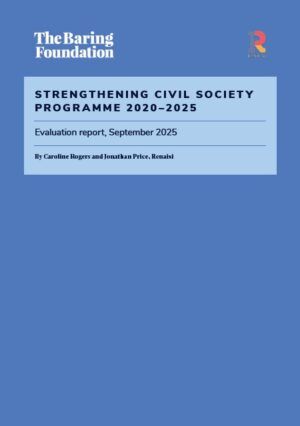The challenges facing civil society organisations delivering legal and human rights show little sign of improvement a year into a Labour administration and after almost 15 years of Conservative rule. Decades of underfunding, increasing costs and a hostile political environment make it difficult to ensure adequate scrutiny of public decisions, challenge unjust or unfair practice and take a systemic approach to social change. At the same time, organisations are increasingly reliant on legal approaches as other avenues to secure change – such as policy influencing – have become harder to leverage. These difficulties have intensified over many years and will be familiar reading for many.
Over the past ten years, the Baring Foundation’s Strengthening Civil Society (SCS) programme has aimed to address these challenges, supporting civil society organisations to use legal and human rights-based approaches to tackle discrimination and disadvantage and safeguard the voluntary sector, in collaboration with one another.
The Foundation commissioned Renaisi to evaluate the programme’s progress towards its objectives, including an exploration of the impact of the Foundation’s ways of working, and take stock of the Foundation’s position in the sector. We have published our full report, which is available here, and share some broader reflections from our evaluation below.
Key successes of the programme
The programme played a key role in supporting the development and sustainability of sector infrastructure. Organisations that deliver infrastructure functions build deep relationships, increase knowledge and develop networks that other organisations, coalitions and initiatives can build on. Supporting these organisations often creates ripple effects for the rest of civil society in terms of their knowledge, understanding and ability to use the law and human rights-based approaches to social change.
The programme was instrumental in supporting organisations to grow, expand and work in new ways. The Foundation’s funding enabled many organisations and projects to scale their work, expand into new areas, develop new skills, develop new collaborations or spin out into independent organisations.
I must say that they stepped up and supported us through these difficult times. And yeah, we very much rose from the ashes. And really, kind of like, went from like, strength to strength after that.
Grant holder interviewee
The programme supported organisations flexibly, taking a learning approach and adapting to new information and contexts. When organisations innovate and develop new ways of working, outcomes can take a long time to emerge and this can feel risky. As such, the Foundation and grant holders need a shared appetite for risk and a foundation of mutual trust. We found that giving flexibility in how grant funding is spent supports organisations to adapt and respond to both what they are learning and a rapidly changing context.
A key outcome of the programme was enabling and facilitating collaborative working across civil society. Partnership working was a vital ingredient of most of the effective legal action identified in this evaluation. In some cases, this was tactical and time-limited. In others they took the form of longer term, movement-wide coalitions.
Collaborative work is generally built on relationships, and building these requires an investment of time and capacity. Convening, including the Baring Foundation residentials, as well as conferences or regular communities of practice, was found to be an important way of grant holders to build such relationships as a foundation for collaborative working.
What we learned
Litigation and legal expertise exist as part of a wider ecosystem of tools and tactics for achieving social change. These are powerful tools that do not stand alone. Connecting up legal tactics with communications, campaigning and policy work can support and amplify them, leading to more holistic social change strategies that achieve desired outcomes.
Using legal approaches to achieve social change takes a long time. It is often decades, not years, before outcomes and impacts will be fully realised. As such, funding such work needs to come with long-term commitments, and an understanding that short-term outcomes may not reflect the potential of the work beyond the duration of an initial grant.
Supporting organisations with deep expertise, community roots and passion for their work is key. This means following ‘good ideas’ when funding work, rather than limiting the focus of funding programmes to particular thematic areas. This leads to projects and approaches that have emerged organically from an organisation or community, which are more likely to stand the test of time and bear fruit in the long term. While it may lead to some thematic ‘gaps’ the reward is greater depth and more integrated work.
What the future looks like
The external economic and political context is increasing the financial vulnerability and precarity felt by many organisations. Grant holders are particularly concerned about the paucity of available funding for legal and human rights work.
The Foundation’s funding has created opportunities for voluntary sector organisations to expand into new areas of work, test out new approaches and learn from them, and highlight their achievements to other funders. However, despite examples of organisations successfully securing funding from other sources to continue and scale their work, the field remains reliant on a relatively small pool of funders. This evaluation found relatively weak evidence for the programme’s impact on leveraging further sources of funding for this work, creating challenges for sustaining it going forward.
Within the wider funding landscape, the work funded by the Foundation remains ‘niche’. While the SCS programme has supported civil society to weather the current storms, organisations need ongoing help from funders working in coalition to ensure the ongoing sustainability of the sector.
Caroline is Senior Project Manager and Jonathan a Principal Consultant at Renaisi.
You can find the evaluation of the first five years of this programme (2015-2020) here
